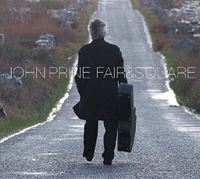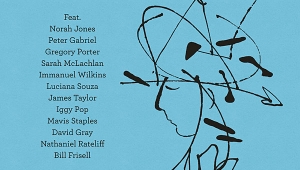| Columns Retired Columns & Blogs |
Recording of August 2005: Fair & Square
JOHN PRINE: Fair & Square
Oh Boy OBR-034 (CD). 2005. John Prine, prod.; Gary Paczosa, prod., eng.; Thomas
Johnson, Brandon Bell, asst. engs. AAD? TT: 62:16
Performance ****½
Sonics ****½
Oh Boy OBR-034 (CD). 2005. John Prine, prod.; Gary Paczosa, prod., eng.; Thomas
Johnson, Brandon Bell, asst. engs. AAD? TT: 62:16
Performance ****½
Sonics ****½
In 1998, it looked for a time as if one of America's finest singing and songwriting voices might be silenced. Fortunately, John Prine, a solo-guitar-and-voice dynamo and the composer of such wry folk-rock hymns as "Dear Abby," "Illegal Smile," and "The Oldest Baby in the World," beat the illness that nearly laid him low and now has released Fair & Square, his first studio album of all new material in nine years.
 The Chicago native (and pal of the late Steve Goodman) contracted what he calls "neck cancer" just after he'd turned 50, married for the third time, and become a father for the first. Near-death experiences have a way of reordering earthly priorities, and Prine's experience was no different.
The Chicago native (and pal of the late Steve Goodman) contracted what he calls "neck cancer" just after he'd turned 50, married for the third time, and become a father for the first. Near-death experiences have a way of reordering earthly priorities, and Prine's experience was no different.
"It just confirmed what I'd been suspectin' all along," he said in a recent interview from his home in Nashville: "that life is real sweet and remember to enjoy it."
Another change wrought by Prine's illness was less philosophical and more physical. Either the surgery itself or the follow-up radiation changed his voice, making it raspier and lowering it an octave. He says there's been a silver lining to this—singing his old songs in lower keys has made them feel new again.
One thing that hasn't changed is Prine's ability to write enchanting melodies and alternately funny and poignant lyrics. If there were any doubts about whether he could return to full strength after his illness, they are effectively blown to bits by the first song on Fair & Square, "Glory of True Love," which ranks with "Angel from Montgomery" and his anti-war paean, "Sam Stone," as one of Prine's bona fide anthems. He doesn't see it in quite those terms, however.
"I wrote it as an album opener, a show opener, so I could walk out on stage, start strummin' the guitar and singing something at that tempo. I wanted it to be a little humorous, but not humorous enough that it took a lot of attention to listen to because you [the crowd] get in your seat, you spilled your popcorn, you just had your second beer. I wanted something that bounced along that was a pretty good idea, something that said 'Welcome, now sit down and get ready, 'cause here comes the rest.' "
Prine, has always been a political songwriter to some degree, but "Some Humans Ain't Human," one of his patented sing-song message numbers, has become Fair & Square's most talked-about track. The opening verse likens hearts to neglected refrigerators and contains what is one of his most hilariously vivid images, "ice cubes with hair"—"It's not something you want to lay on your date," he says with a chuckle—and the chorus plainly states Prine's feelings about mankind's less savory qualities: "Jealously and stupidity / Don't equal harmony." It continues with a verse that Prine speaks rather than sings: "Have you ever noticed / When you're feeling really good / There's always a pigeon / That'll come shit on your hood / Or you're feeling your freedom / And the world's off your back / Some cowboy from Texas / Starts his own war in Iraq."
The controversy the song has generated has given the 58-year-old Prine "mixed feelings" about it. On one hand, he says, he doesn't like anything "that's even close to a cheap shot." But on the other, "Politics are different these days. Really different. When you think back on how cut-and-dried the people that were either for our presence in Vietnam or against it, how cut-and-dried it was, and today you take a group of five people and you don't know. You can be talking and the subject will go to politics and you don't know who you are talking to. That same person you agreed [with] on music, agreed on the time of day, agreed on this and that, will turn around and go, 'What's the matter with George Bush?' Look ya dead in the eyes and say it.
"I didn't write that song to be a political song. I wanted to say it and get out of it as fast as I could and not make a big deal out of it. People are writing me letters—this is the part I don't get—saying, 'I've been a fan for 30 years, 35 years, and I don't come to your shows to hear politics.' Well, what in the hell did they think I've been talking about? That's the political climate. They applied their own set of rules to 'Sam Stone.' "
Prine says the pastoral "Taking a Walk"—which he says, has been wrongly interpreted as a statement of how his cancer scare has imbued him with a new appreciation for life's simple pleasures—is the album's true political song. (Acclaimed newcomer Mindy Smith adds a solid guest vocal to this tune.) "The girl in 'Taking a Walk' is Liberty, and she's a mess. She's hardly recognizable."
"My Darlin' Hometown" features Jerry Douglas on a dobro-like Weissenborn guitar, and Alison Krauss and Dan Tyminski (the voice of "Man of Constant Sorrow") on harmony vocals. Here Prine plows a familiar furrow in ground he first broke in his 1971 classic, "Paradise." On "Morning Train," Prine and guitarist Pat McLaughlin, who plays and sings on most of the album and cowrote two of its songs, take a successful if laid-back stab at the blues.
Finally, the man shows his generosity by including, on this first album of new material in nine years, two wonderful covers: A.P. Carter's "Bear Creek Blues" and the late Blaze Foley's "Clay Pigeons." A semilegendary character and sometime singer-songwriter, Foley may be most famous as the subject of Lucinda Williams' song "Drunken Angel." Prine was drawn to find out about Foley after he heard Merle Haggard's cover of another Foley tune, "If I Could Only Fly."
"The name seemed vaguely familiar. Well, it turns out we knew each other, and I guess the times we spent together were probably . . . pretty . . . ah, well, Austin in the Seventies, you could hang out with somebody for a week and not know their name. [laughs]"
While it's tempting to say that cancer made Fair & Square quieter, more thoughtful than it otherwise might have been, the album is as vital, playful, and edgy as Prine's 1971 debut album, John Prine. Happily, Fair & Square sounds much better than that milestone, possessing what Stereophile editor John Atkinson calls "a glorious sound" as warm and full of life as its irreplaceable creator.—Robert Baird
- Log in or register to post comments




































